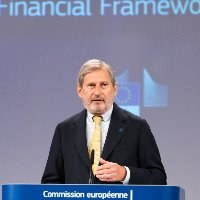(BRUSSELS) – The European Commission proposed Tuesday a EUR 65 bn increase to the EU’s 2024-2027 budget to finance support to Ukraine, action on migration, and investments in strategic industries.
While getting EU member states to finance the increase will not be an easy task, the EU executive said the EU had faced a series of unprecedented and unexpected challenges, heading these being Russia’s brutal invasion of Ukraine and its huge humanitarian, economic and budgetary consequences.
Migration had risen following the pandemic, putting strains on Member States’ reception and integration capacities. andUnder the New Pact on Migration and Asylum, the Union and the Member States will be taking on new responsibilities, which imply additional costs. A steep acceleration in inflation and interest rates had impacted the Union’s budget, amongst others through a sharp increase in NextGenerationEU funding costs.
The EU executive says significant investment is needed to foster long-term competitiveness in technologies crucial for Europe’s leadership.
Addressing the challenges had pushed the resources of the EU budget ‘to the point of exhaustion’, hindering the EU budget’s capacity to address even the most urgent challenges.
“The EU budget has been instrumental to the EU’s recovery from the pandemic, while supporting the green and digital transformation and the long-term resilience,” said Budget Commissioner Johannes Hahn: “The EU budget has also been the monetary expression of the EU’s unconditional support to Ukraine. The multiple challenges over the past years have exhausted its flexibilities and capacity to react to future crises. If we want to be able to continue to rely on it, we need to act now.”
The new proposals seek to provide for targeted reinforcements in a limited number of priority areas, to ensure that the EU budget can continue to deliver on the most essential objectives. The main elements are:
- A Ukraine facility, based on grants, loans and guarantees, with an overall capacity of 50 billion in the period 2024-2027 to cater for Ukraine’s immediate needs, recovery and modernisation on its path towards the EU.
- A reinforcement of the EU budget to address internal and external dimensions of migration as well as needs arising from the global consequences of Russia’s war of aggression in Ukraine, and to strengthen partnerships with key third countries with 15 billion.
- A Strategic Technologies for Europe Platform (STEP) to promote the EU’s long-term competitiveness on critical technologies, in the fields of digital and deep tech, clean tech and biotech. For a quick and effective deployment on the ground, this platform builds on and tops up existing instruments including InvestEU, the Innovation Fund, the European Innovation Council (EIC) and the European Defence Fund, while also introducing new flexibilities and incentives for cohesion funding and the Recovery and Resilience Facility.
- An efficient mechanism to cater for the higher NextGenerationEU funding costs due to the unprecedented surge in interest rates. A new special ‘EURI Instrument’ will cover exclusively the costs that come on top of the original projections that were made in 2020.
In addition, the Commission says the EU administrative capacity will be adjusted to cater for the new tasks that have been decided by the co-legislators since 2020 and to meet inflation-adjusted contractual obligations.
Commission proposal to reinforce long-term EU budget to face most urgent challenges - guide
EU budget: Strategic Technologies for Europe Platform (STEP) to support European leadership on critical technologies - guide
Strategic Technologies for Europe Platform
Factsheet A New Ukraine Facility
A new Ukraine Facility - guide


